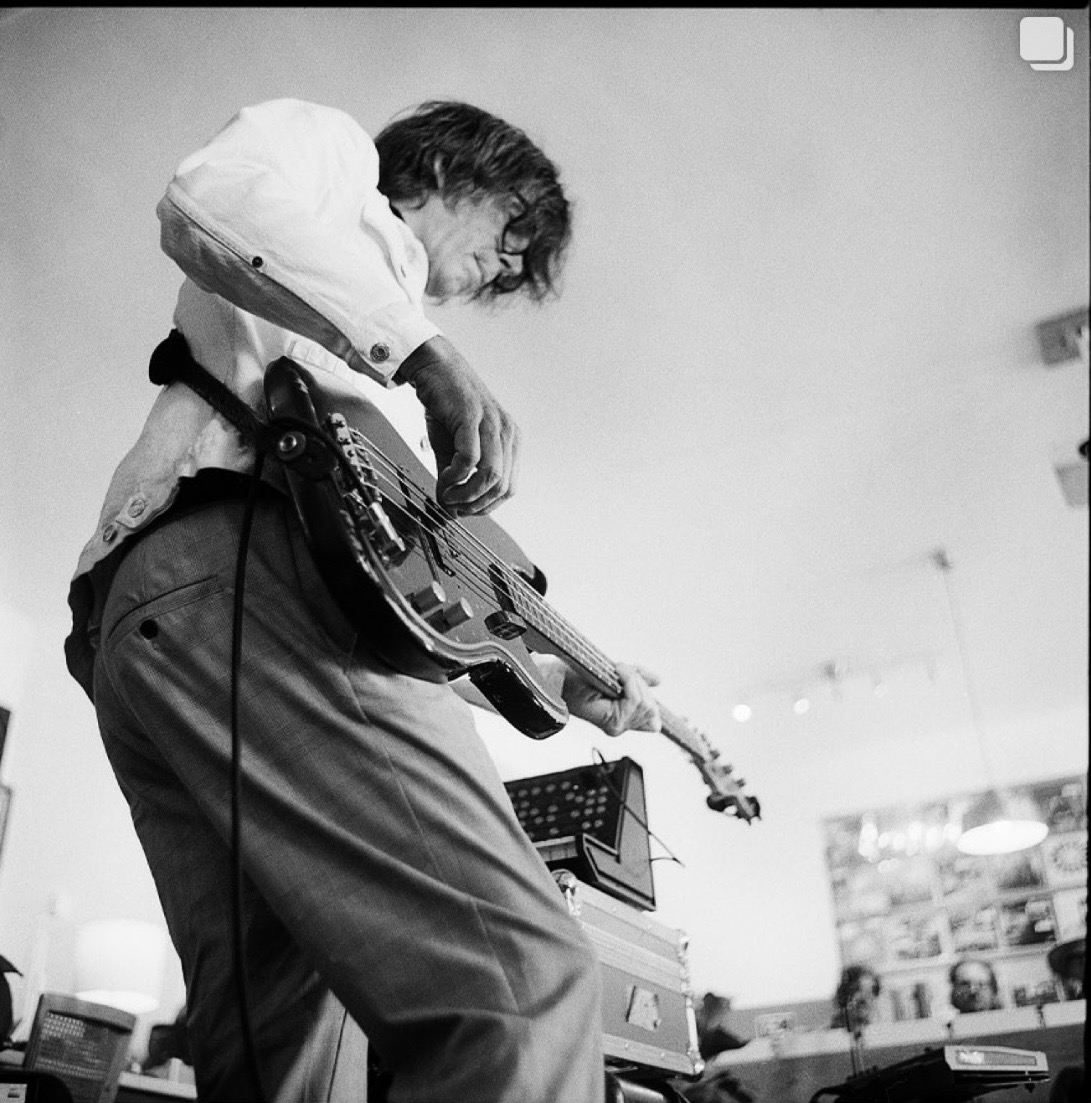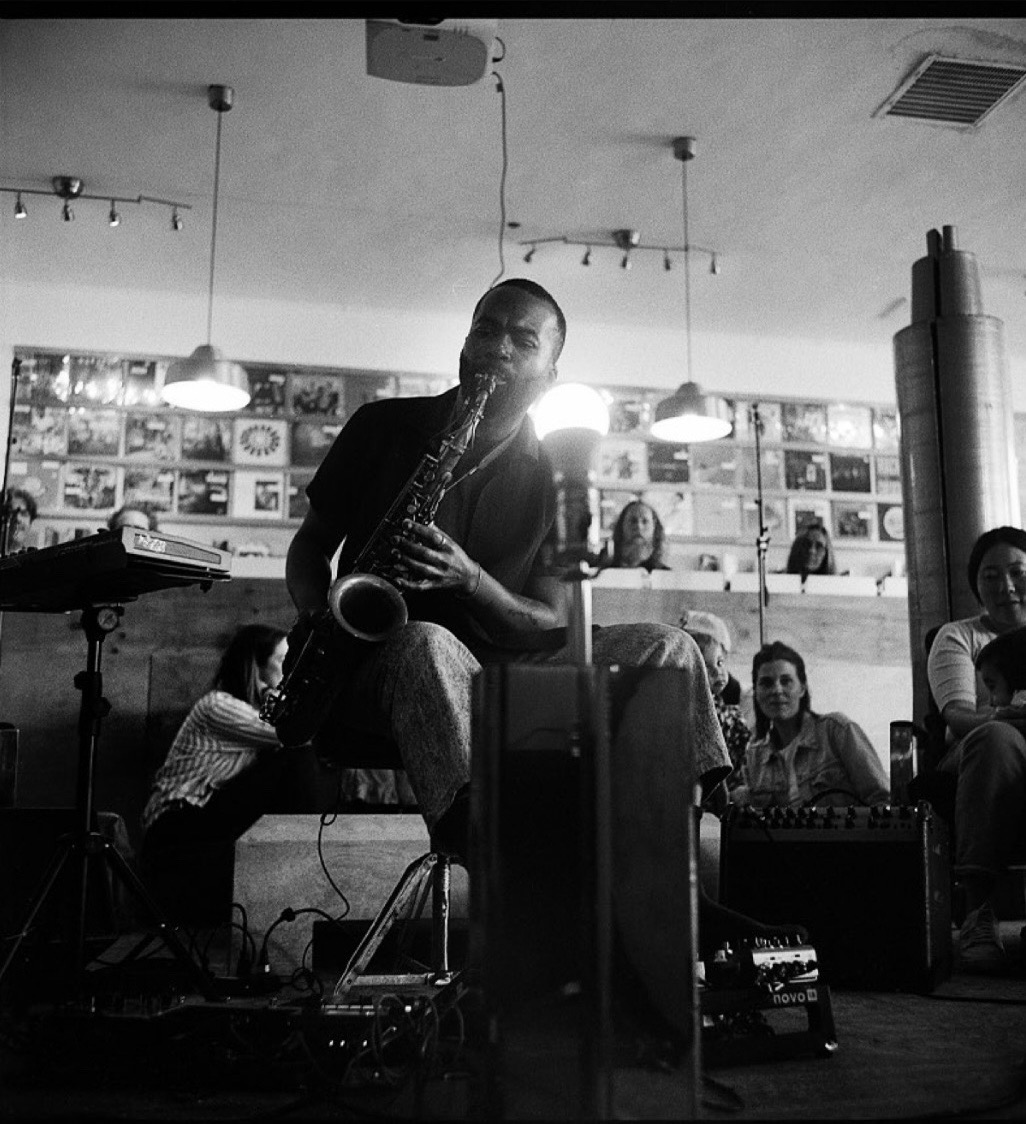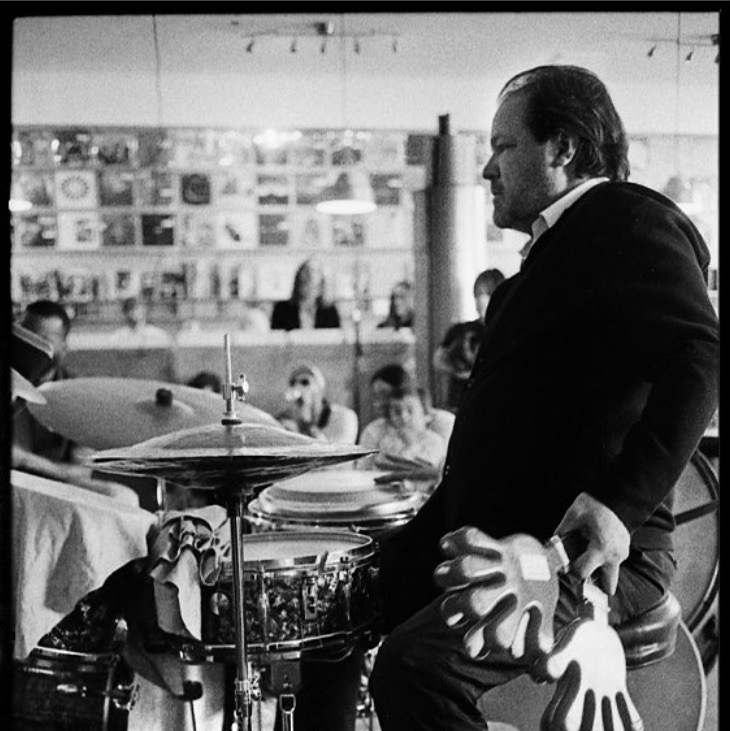


Grammy-winning bassist, composer and producer Paul Bryan returns with the eclectic, experimental trio album Western Electric
Due out May 2024, the album features drummer Jay Bellerose and saxophonist Josh Johnson on an adventurous mix of the spontaneous groove and studio wizardry
Strange combinations often yield fascinating results. That’s as true on a cosmic scale – just think, the collision of a few stray particles aeons ago sparked the universe we exist in today – as it is in the recording studio. To cite two examples among many: in 1960, jazz giants Papa Jo Jones and Milt Hinton entered a NYC recording studio and emerged with Percussion and Bass, a historical curiosity as compelling as it is playful; and Sonny Rollins’ 1957 classic Way Out West, on which the Saxophone Colossus pioneered the chordless sax trio.
Both of those albums were formative influences on Paul Bryan and in particular on his new album, Western Electric. Not that the present recording sounds anything like those idiosyncratic forebears – after all, it was created from its own, thoroughly modern set of strange combinations.
Bryan himself brings a unique combination of talents and credits to bear: a Grammy-winning producer, composer, arranger, bassist and multi-instrumentalist, Bryan is equally at home crafting songs with singer-songwriter Aimee Mann or improvising with genre-defiant artists like Jeff Parker, Dustin Laurenzi or Jeremy Cunningham; creating mesmerizing orchestral arrangements for Nina Nastasia or anchoring the groove with Elvis Costello or Lucinda Williams.
To that already volatile mix Bryan has added the singular voices of in-demand drummer Jay Bellerose and acclaimed saxophonist Josh Johnson. The medium for the trio’s alchemical experiments was Bryan’s own eponymous Los Angeles studio, Western Electric, which is every bit as much of a presence on the album as the musicians themselves. The album’s predecessor, Bryan’s 2020 solo outing Cri$el Gems, grew out of his year-long residency at the renowned L.A. venue ETA and retained a spontaneous, live feel; Western Electric, by contrast, draws on the full, expansive spectrum of Bryan’s roles to conjure something uncategorizable but alluring, an offbeat experiment that is as funky and infectious as it is eccentric and hybridized.
Due out May, 2024, Western Electric also grew out of a strange combination of influences. Many of Bryan’s initial sketches for the album were composed on his Yamaha VSS keyboard, virtually a toy instrument itself, along with an outdated drum machine. “Usually I write on piano, but this time I just gave myself this weird little palette,” Bryan explains. “I decided I was going to write music with this little two-octave keyboard and see what happens, and then open it up with Josh and Jay.”
The spirit of two old friends improvising without expectations was grafted from Percussion and Bass onto Bryan’s nearly lifelong friendship and collaboration with Bellerose. His love of Way Out West then led him to muse on whether a similar trio would work with electric fuzz bass and electronically-altered alto sax in place of Ray Brown’s acoustic upright and Rollins’ mighty tenor. “So we just tried it and it was so much fun,” Bryan recalls. “I could feel that the fuse had been lit.”
The parallels between Way Out West and Western Electric also stem from the dichotomies of living between coasts. Bryan has been based in Los Angeles for roughly two decades at this point, but it may only be with this release that the one-time New Yorker (by way of Boston and Berklee) is ready to call himself a tried and true Angeleno. The city’s warped glamour is reflected throughout the album’s fluid yet disruptive grooves. The trio’s music is vast and spacious but dense in an elusively seductive fashion.
The deceptive, off-kilter rhythm of “Ethervane” opens the album on an invitingly disorienting note, before “Family Man” erupts into a distorted, reverb-laden dub vibe in homage to Wailers bass legend Aston “Family Man” Barrett. “I owe my existence to Family Man and a couple of other bass players,” Bryan says. “All of Bob Marley's music comes down to a duet between Bob Marley and Family Man – there's no other melodic information. So I was exploring that concept of a bass line that almost, but not quite, functions as the melody.”
“Bon Jemmott” is a brief excursion draws on the inspiration of another of those foundational bass influences, the ubiquitous session bassist Jerry Jemmott, whose resumé includes landmark hits by Aretha Franklin, Ray Charles, Freddie King, B.B. King, Wilson Pickett and countless others. (Of Bryan’s holy trinity of bass only Steve Swallow is denied an explicit dedication, though his electric jazz innovations are deeply embedded in the album’s genetics). The rippling echoes and shimmering textures of “Pascoal’s Wager,” meanwhile, are a nod to the brilliant Brazilian composer Hermeto Pascoal.
“Jazz Bass” is named for Bryan’s spine of a bass line, on which hinges two drum tracks panned in the mix, an entrancing example of his studio wizardry. “workingthankyousolid!” stems more from serendipity, marking the drumkit debut of Alexandra Heird, Bryan’s wife’s assistant, whose untrained beats (and lilting voice) are looped into something accidentally musical. The transcendent beauty of “August and the Colonel” was far more purposeful, dreamed up in honor of the composer’s late father.
Each track on the album emerges with its own surprises, enticements and unexpected detours. Western Electric is a wholly original album that exists between coasts, between genres, between influences, thriving on the journeys and collisions between them.
-Shaun Brady (Philadelphia Inquirer, Jazziz, Jazz Times)
Due out May 2024, the album features drummer Jay Bellerose and saxophonist Josh Johnson on an adventurous mix of the spontaneous groove and studio wizardry
Strange combinations often yield fascinating results. That’s as true on a cosmic scale – just think, the collision of a few stray particles aeons ago sparked the universe we exist in today – as it is in the recording studio. To cite two examples among many: in 1960, jazz giants Papa Jo Jones and Milt Hinton entered a NYC recording studio and emerged with Percussion and Bass, a historical curiosity as compelling as it is playful; and Sonny Rollins’ 1957 classic Way Out West, on which the Saxophone Colossus pioneered the chordless sax trio.
Both of those albums were formative influences on Paul Bryan and in particular on his new album, Western Electric. Not that the present recording sounds anything like those idiosyncratic forebears – after all, it was created from its own, thoroughly modern set of strange combinations.
Bryan himself brings a unique combination of talents and credits to bear: a Grammy-winning producer, composer, arranger, bassist and multi-instrumentalist, Bryan is equally at home crafting songs with singer-songwriter Aimee Mann or improvising with genre-defiant artists like Jeff Parker, Dustin Laurenzi or Jeremy Cunningham; creating mesmerizing orchestral arrangements for Nina Nastasia or anchoring the groove with Elvis Costello or Lucinda Williams.
To that already volatile mix Bryan has added the singular voices of in-demand drummer Jay Bellerose and acclaimed saxophonist Josh Johnson. The medium for the trio’s alchemical experiments was Bryan’s own eponymous Los Angeles studio, Western Electric, which is every bit as much of a presence on the album as the musicians themselves. The album’s predecessor, Bryan’s 2020 solo outing Cri$el Gems, grew out of his year-long residency at the renowned L.A. venue ETA and retained a spontaneous, live feel; Western Electric, by contrast, draws on the full, expansive spectrum of Bryan’s roles to conjure something uncategorizable but alluring, an offbeat experiment that is as funky and infectious as it is eccentric and hybridized.
Due out May, 2024, Western Electric also grew out of a strange combination of influences. Many of Bryan’s initial sketches for the album were composed on his Yamaha VSS keyboard, virtually a toy instrument itself, along with an outdated drum machine. “Usually I write on piano, but this time I just gave myself this weird little palette,” Bryan explains. “I decided I was going to write music with this little two-octave keyboard and see what happens, and then open it up with Josh and Jay.”
The spirit of two old friends improvising without expectations was grafted from Percussion and Bass onto Bryan’s nearly lifelong friendship and collaboration with Bellerose. His love of Way Out West then led him to muse on whether a similar trio would work with electric fuzz bass and electronically-altered alto sax in place of Ray Brown’s acoustic upright and Rollins’ mighty tenor. “So we just tried it and it was so much fun,” Bryan recalls. “I could feel that the fuse had been lit.”
The parallels between Way Out West and Western Electric also stem from the dichotomies of living between coasts. Bryan has been based in Los Angeles for roughly two decades at this point, but it may only be with this release that the one-time New Yorker (by way of Boston and Berklee) is ready to call himself a tried and true Angeleno. The city’s warped glamour is reflected throughout the album’s fluid yet disruptive grooves. The trio’s music is vast and spacious but dense in an elusively seductive fashion.
The deceptive, off-kilter rhythm of “Ethervane” opens the album on an invitingly disorienting note, before “Family Man” erupts into a distorted, reverb-laden dub vibe in homage to Wailers bass legend Aston “Family Man” Barrett. “I owe my existence to Family Man and a couple of other bass players,” Bryan says. “All of Bob Marley's music comes down to a duet between Bob Marley and Family Man – there's no other melodic information. So I was exploring that concept of a bass line that almost, but not quite, functions as the melody.”
“Bon Jemmott” is a brief excursion draws on the inspiration of another of those foundational bass influences, the ubiquitous session bassist Jerry Jemmott, whose resumé includes landmark hits by Aretha Franklin, Ray Charles, Freddie King, B.B. King, Wilson Pickett and countless others. (Of Bryan’s holy trinity of bass only Steve Swallow is denied an explicit dedication, though his electric jazz innovations are deeply embedded in the album’s genetics). The rippling echoes and shimmering textures of “Pascoal’s Wager,” meanwhile, are a nod to the brilliant Brazilian composer Hermeto Pascoal.
“Jazz Bass” is named for Bryan’s spine of a bass line, on which hinges two drum tracks panned in the mix, an entrancing example of his studio wizardry. “workingthankyousolid!” stems more from serendipity, marking the drumkit debut of Alexandra Heird, Bryan’s wife’s assistant, whose untrained beats (and lilting voice) are looped into something accidentally musical. The transcendent beauty of “August and the Colonel” was far more purposeful, dreamed up in honor of the composer’s late father.
Each track on the album emerges with its own surprises, enticements and unexpected detours. Western Electric is a wholly original album that exists between coasts, between genres, between influences, thriving on the journeys and collisions between them.
-Shaun Brady (Philadelphia Inquirer, Jazziz, Jazz Times)